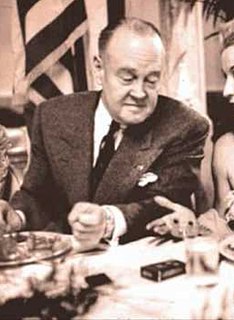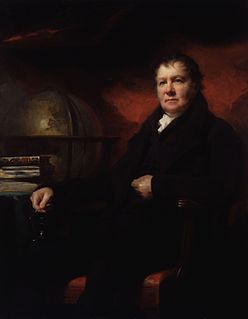A Quote by Aristotle
Any change of government which has to be introduced should be one which men, starting from their existing constitutions, will be both willing and able to adopt, since there is quite as much trouble in the reformation of an old constitution as in the establishment of a new one, just as to unlearn is as hard as to learn.
Related Quotes
The honest and serious student of American history will recall that our Founding Fathers managed to write both the Declaration of Independence and the Constitution without using the term 'democracy' even once. No part of any of the existing state Constitutions contains any reference to the word. [The men] who were most influential in the institution and formulation of our government refer to 'democracy' only to distinguish it sharply from the republican form of our American Constitutional system.
Ours was the first revolution in the history of mankind that truly reversed the course of government, and with three little words: 'We the people.' 'We the people' tell the government what to do, it doesn't tell us. 'We the people' are the driver, the government is the car. And we decide where it should go, and by what route, and how fast. Almost all the world's constitutions are documents in which governments tell the people what their privileges are. Our Constitution is a document in which 'We the people' tell the government what it is allowed to do. 'We the people' are free.
Continuous wars - which we have now had since 2001 - starting with Afghanistan, continuing on to Iraq. And even since Iraq, it's been more or less continuous. The appalling war in Libya, which has wrecked that country and wrecked that part of the world, and which isn't over by any means. The indirect Western intervention in Syria, which has created new monsters. These are policies, which if carried out by any individual government, would be considered extremist. Now, they're being carried out collectively by the United States, backed by some of the countries of the European Union.
The moral principles and precepts contained in the Scriptures ought to form the basis of all our civil constitutions and laws . . . The religion which has introduced civil liberty is the religion of Christ and his Apostles . . . This is genuine Christianity and to this we owe our free constitutions of government.
Everything is only for a day, both that which remembers and that which is remembered. Observe constantly that all things take place by change, and accustom thyself to consider that the nature of the Universe loves nothing so much as to change the things which are and to make new things like them. For everything that exists is in a manner the seed of that which will be.
I heartily accept the motto, "That government is best which governs least"; and I should like to see it acted up to more rapidly and systematically. Carried out, it finally amounts to this, which also I believe — "That government is best which governs not at all"; and when men are prepared for it, that will be the kind of government which they will have. Government is at best but an expedient; but most governments are usually, and all governments are sometimes, inexpedient.
There is still a tendency to regard any existing government intervention as desirable, to attribute all evils to the market, and to evaluate new proposals for government control in their ideal form, as they might work if run by able, disinterested men free from the pressure of special interest groups.
In every remodelling of the present, the existing condition of things must be supplanted by a new one. Now every variety of circumstances in which men find themselves, every object which surrounds them, communicates a definite form and impress to their internal nature. This form is not such that it can change and adapt itself to any other a man may choose to receive; and the end is foiled, while the power is destroyed, when we attempt to impose upon that which is already stamped in the soul a form which disagrees with it.
Many years have passed since that night. The wall of the staircase up which I had watched the light of his candle gradually climb was long ago demolished. And in myself, too, many things have perished which I imagined would last for ever, and new ones have arisen, giving birth to new sorrows and new joys which in those days I could not have foreseen, just as now the old are hard to understand.
I don't doubt that every prince would like to be both; but since it is hard to accomodate these qualities, if you have to make a choice, to be feared is much safer than to be loved. For it is a good general rule about men, that they are ungrateful, fickle, liars, and deceivers, fearful of danger and greedy for gain....[love] is a link of obligation which men, because they are rotten, will break anything they think doing so serves their advantage; but fear involves dread of punishment, from which they can never escape.
If Aristotle, Livy, and Harrington knew what a republic was, the British constitution is much more like a republic than an empire. They define a republic to be a government of laws, and not of men. If this definition is just, the British constitution is nothing more or less than a republic, in which the king is first magistrate. This office being hereditary, and being possessed of such ample and splendid prerogatives, is no objection to the government's being a republic, as long as it is bound by fixed laws, which the people have a voice in making, and a right to defend.
It is essential..that you should form and adopt certain rules or principles, for the government of your own conduct and temper. Unless you have such rules and principles, there will be numberless occasions on which you will have no guide for your government but your passions..It is in the Bible, you must learn them, and from the Bible how to practice them.
The Author of nature has not given laws to the universe, which, like the institutions of men, carry in themselves the elements of their own destruction; he has not permitted in his works any symptom of infancy or of old age, or any sign by which we may estimate either their future or their past duration. He may put an end, as he no doubt gave a beginning, to the present system at some determinate period of time; but we may rest assured, that this great catastrophe will not be brought about by the laws now existing, and that it is not indicated by any thing which we perceive.









































